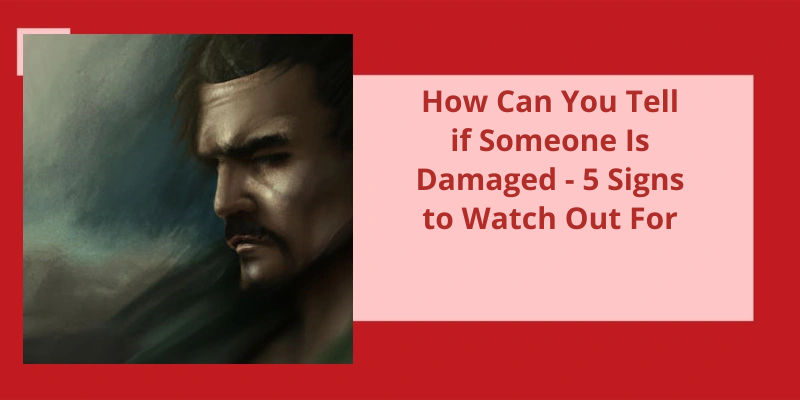One of the most challenging things in life is dealing with emotional damage. Whether it's from past relationships, traumatic experiences or just the stresses of daily life, there are many signs that someone may be emotionally damaged. It's not always easy to spot these signs, but there are a few common patterns that can help you to identify them. These include issues with love and relationships, negative thought patterns, poor self-care habits, and a tendency to enjoy being alone. Additionally, those who’re emotionally damaged often experience feelings of regret, guilt, and shame on a regular basis. If you suspect that someone you know is struggling with emotional damage, it's important to reach out and offer support.
How Do You Know if Someone Is Emotionally Damaged?
Detecting emotional damage in others isn’t always a straightforward process. Many people who’ve gone through trauma may try to hide their hurt and pain from others. You may have a friend or a colleague who appears happy and well-adjusted on the outside, but is struggling with emotional issues deep within. Hence, detecting emotional damage may require a good amount of empathy and understanding.
One sign of emotional damage is frequent mood swings. If someone is unable to regulate their emotions and swings wildly from feeling extreme sadness to inexplicable anger or irritability, this may be a sign that they’re emotionally damaged. Additionally, someone who’s emotionally damaged may withdraw from previously enjoyed activities, friends, or family. They may also have difficulty communicating with others, leading to a lack of connection in relationships.
Someone who’s undergone emotional damage may also struggle with trust issues. If someone is extremely guarded, distrustful of others, and struggles to form close relationships, this may be a sign that they’ve been emotionally damaged. People who’ve gone through emotional trauma may also put up emotional barriers that keep them from forming deeper connections with others.
The way a person interacts with others can also be an indicator of emotional damage. Those who’ve been emotionally damaged may exhibit self-destructive behavior, such as substance abuse or engaging in risky behaviors. They may also struggle with their own self-worth, leading to negative self-talk and poor self-esteem. Those who’ve experienced emotional trauma may also have difficulty with intimacy, leading to problems in romantic relationships.
It’s a complex issue that can manifest in many different ways, and often requires professional help to overcome. If you suspect someone you know is emotionally damaged, the best thing you can do is to offer support and suggest they seek professional help.
When a person is described as “damaged,” it typically means that they’ve experienced some sort of harm or injury, either physical or emotional. This can manifest itself in a variety of ways, from physical scars to mental health issues, and can have a profound impact on the individual’s life. In the following sections, we will explore some of the ways in which people can be “damaged,” and how this can affect their relationships and interactions with others.
What Does It Mean if a Person Is Damaged?
When a person is described as being damaged, it typically means that they’ve experienced harm or injury in some way. This harm can be physical, such as from an accident or medical condition, or it can be emotional or psychological, such as from trauma or abuse. The individual may also be described as being spoiled or ruined, indicating that they’re no longer in their original, pristine state.
For example, someone who’s a substance abuse problem or engages in criminal activities may be seen as being damaged. This can indicate that their behavior has led to negative consequences for themselves and those around them.
The concept of being damaged can also have broader societal implications. For example, certain populations may be seen as being damaged due to systemic discrimination or inequality. This can include groups such as racial minorities, low-income individuals, and those with disabilities. In these cases, the damage isn’t necessarily due to something that the individual has done or experienced personally, but rather the result of larger societal factors.
When a person is described as being damaged, it can have significant implications for their identity and self-worth. They may struggle with feelings of shame, inadequacy, or worthlessness as a result of the harm or injury they’ve experienced. It’s important to provide support and resources to individuals who’ve been damaged in order to help them cope and heal from their experiences.
While it can indicate harm or injury, it can also be used to stigmatize or marginalize certain individuals or groups. It’s important to approach this term with sensitivity and compassion in order to support those who’ve been affected.
Exploring the Long-Term Effects of Being Described as Damaged on a Person’s Mental Health and Identity.
This topic examines how being labeled as “damaged” can affect someone’s mental health and sense of self over a prolonged period of time.
Conclusion
In summary, it can be a challenging task to identify whether someone is emotionally damaged or not, as it isn’t always easy to spot. However, there are common signs that may indicate emotional scars that can cause love disorders, negative thinking patterns, poor self-care habits, the enjoyment of being alone, and a persistent feeling of guilt, shame, and regret. It’s essential to approach these individuals with empathy and understanding rather than judgment, as they may be facing inner struggles that aren’t immediately apparent. Seeking professional help and having a support system can aid in recovery from emotional trauma and eventually lead to a healthier, happier life. It’s crucial to remember that everyone deserves love, respect, and care, and emotional damage doesn’t define a person's worth.






